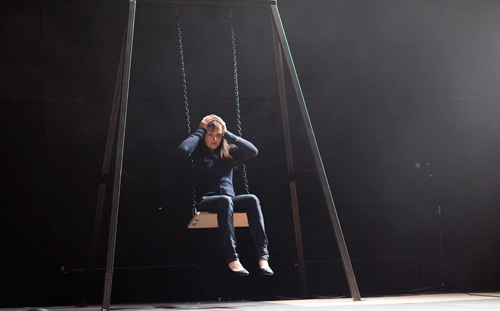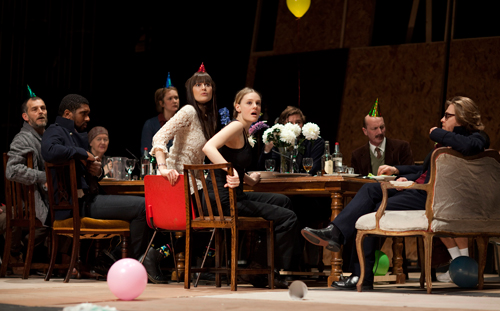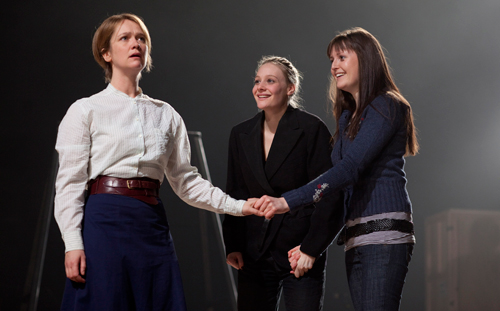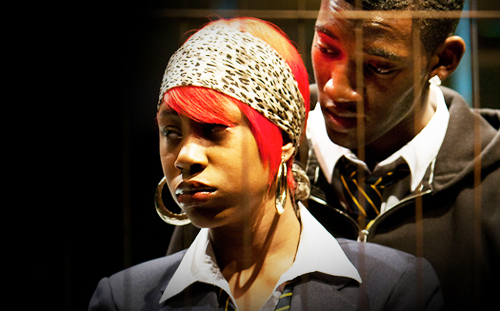
“Do you mind if I have a bit of my croissant while we chat?” Clare Dunne asks in a lilting Irish brogue, “only I haven't had any dinner really.”
Dunne is, in her own words, shattered. Not surprising as she is in the first week of a much talked about production of Chekhov's Three Sisters at the Lyric, Hammersmith. With previews and press nights out of the way, she took the opportunity to sneak over to Cardiff for a few hours and has literally come straight from Wales to this interview and then to go on stage as Irina in Chekhov's masterpiece.
I first met Dunne a year ago when she was a student at Royal Welsh College of Music and Drama, playing a winsome Millie Dillmount in Thoroughly Modern Millie. At the mention of Millie, Dunne falls about in hysterics “I wasn't at all experienced in singing and dancing at the same time,” she howls. “That was such a huge project, obviously, as I bleeding well played Millie, and I'd never tap-danced before! But it was fantastic, sure.”
Landing the leading role in the RWCMD musical has been a wonderful launch pad for former RWCMD alumni. Kimberly Nixon has dominated stage and screen since taking the lead in Quadrophenia at college, Aneurin Barnard played Tony in their West Side Story then the lead in Spring Awakening (which also originated in London at the Lyric, Hammersmith) and is now filming in LA, while Matthew Aubrey, Dunne's co-star, has already notched up film and TV credits prior to taking over the lead role in War Horse.
Dunne's performance as Millie led to her winning her first professional job, before graduation, in The Playboy of the Western World. “That was with a company called Druid, a great way to start off my career. I graduated just after I finished that job. Then, a director I worked with in college, George Perrin, from Nabokov Theatre Company, rang me on my graduation day and asked me to go to Latitude with a new piece of writing, so I had a couple of weeks rehearsal and that's where Ferdy Roberts from Filter and Sean Holmes from the Lyric saw me and asked if I would be interested in doing Irina in Three Sisters and I was, like, “yeah, that'd be cool.”
Between Latitude and Three Sisters however, there was the inevitable period of resting. “I signed on,” Dunne laughs, “which was great! And I did the odd promotional job while I worked on my own show which I took to Dublin. That was a great experience for me. It didn't make a profit but it didn't make that much of a loss, and in the meantime I had a meeting with Sean Holmes and here I am.”
Between Latitude and Three Sisters however, there was the inevitable period of resting. “I signed on,” Dunne laughs, “which was great!”
And if the opportunity to tackle one of Chekhov's great female roles, with an exciting new company, at a prestigious venue, seems to have been handed to Dunne on a plate, well, that's more than just the luck of the Irish; it's also a testament to Dunne's talent.
Next to Romola Garai's deliciously scathing Masha and Poppy Miller's heartbreaking Olga, the relatively inexperienced Dunne is a pleasure to watch. Her prosaic, ingenuous optimism in Act One that gives way to a more world-weary exhaustion by the dénouement is both delightful and difficult to watch. Ollie Dimsdale, the co-Artistic director of Filter and one of the creatives responsible for Three Sisters believes that solid acting is at the core of the production and that Dunne is ‘”terrific; she's come on one of the longest journeys towards our realisation of Three Sisters.”
However it is precisely Filter's realisation that has caught some critics off guard. It is not only the use of an intricate, elaborate soundscape that accentuates the text, but also certain artistic decisions. One critic bemoaned the absence of samovars, another commented on Dunne's modern attire, a hoody and trainers in one act, and one noted the decision to use Dunne's natural accent. “When I first came in to Filter,” recalls Dunne, “they said ‘please just use your own voice and we'll decide if we're doing RP later on'. I was, like, ‘I can do RP, I can really do RP!' but I think they really love the individuality of people and what they bring in essence of themselves. Eventually I was, like, ‘I think I have to start working on the accent' and Sean said it just didn't matter. And we knew, I told them from day one -‘you know the critics will say something about this' – so we knew it from the start and we thought ‘feck it'!”
The accent notwithstanding, Filter's Three Sisters is a complex and difficult piece. It requires the audience to engage much more with the text than say, the Donmar's Ivanov did last year. Surely in order to create this type of theatre, the actors too must engage more with the text? What was the Filter experience like for Dunne? Her immediate response is “Invigorating.”
Then, after some thought she adds “Freeing.” And from this she elucidates. “Day one, I don't know if this explains anything, but day one, we didn't do a read-through. We said our names and then Filter said ‘Let's pick a moment from the play where an action happens, nothing to do with text, just an action, like Irina sits on a chair' and from that we had to create moments, then sounds.' Can you imagine?”
Dunne's incredulity overflows as she remembers the process, she leans forward and she begins to speak in italics. “This is day one! I couldn't even remember anyone's name and we were working intensively on the play until six o'clock! We didn't even touch the text! And I was like, what just happened? And we did that until the end of the second day!” And with that, Dunne sits back in her chair, exhausted “Whoa!” and she laughs.
“It was really unconventional, but it was great, it broke the ice and you saw everyone, even the more experienced people in the cast, you saw them vulnerable. Everyone was a bit like, “Oh God, what is happening here?” and it was great because we have to be vulnerable and human to play these people.”
Led by Ferdy Roberts, Ollie Dimsdale and Tim Phillips, Filter are known for exploring the relationships between sound, text, movement, music. Their method exposes the rhythms and cadences of the text, stripping it bare and then rebuilding it from the very essence. “Filter are like a band,” Dunne explains. “It's about playing off each other and listening to each other, and there are no rules. My favourite catchphrase from this show is ‘Wrong is Strong'. Sean Holmes used that a lot and he's absolutely right. I think a director loves an actor walking into a room and trying something – even if it's the wrong thing. I just think Filter are brilliant, they really go with the absurdity of human nature. I've learned so much. You just have to keep your eyes and ears and heart open.”
We didn't consciously go against conventions, so for me, I was genuinely responding to the text. I think Filter want people to respond to the text, for nothing else to get in the way. Us and Text.
The rehearsal process not only seems to have excited Dunne, but also to have shaped the direction of the play. “I think the style of the piece came out of what we were doing in rehearsal and that influenced everything; set, costume everything. We didn't consciously go against conventions, so for me, I was genuinely responding to the text. I think Filter want people to respond to the text, for nothing else to get in the way. Us and Text. Us and Text. That's what they kept saying, and we kept going until we cracked it. Chekhov is just brilliant at writing human beings, and if you just read the text and listen to the text, it's like a ping-pong ball, all over the place. I think if you can trust that it's enough.”
In their approach to Three Sisters Filter have combined contemporary theatrical techniques with a classical text. For some this has meant giving it new life, for others it has betrayed the spirit of Chekhov's work. For everyone involved however it has sparked an intriguing dialogue concerning text and performance. From Dunne's experiences in rehearsal to the critics, to the audience, Filter have succeeded in engaging everyone in an examination of the text rather than simply a critique on the interpretation or the performances. The collaboration between Filter and the Lyric has been hugely successful in providing students with opportunities to explore the text.
Thoroughly exploiting their work, Filter have created a website www.threesistersrevealed.com which is ostensibly to provide students with the opportunity to discover more about the production. In practice, the website is so informative, so well constructed and thought out, that it perhaps heralds the start of a whole new theatrical experience, where the play is no longer “the thing” but just a part of the whole.
“I look at this as one of the greatest things that has ever happened to me,” enthuses Dunne. “I moved to London, and within a few months got a great theatre job. That's all I ever really wanted, to make enough money to pay the rent, doing something that I love. I have been unbelievably lucky.” The luck of the Irish, yes, but with that a solid training and a determination to succeed, but also to keep learning.
“I've learned so much,” Dunne concludes. “I've learned that the first job is the biggest lesson, you feel like you can't believe you're getting away with it! The gaps can be hard, short or long. Mine was short enough, five months, but I put something on myself, I was staying creative. You have to stay positive and creative. Go for walks, do cultural stuff, go to the theatre. I went to loads of Spotlight talks. To be honest I didn't learn much new, but it's great to refresh your knowledge, to meet other people. It's easy to stay in bed late, but that doesn't work in the end. Go for a run, stay fit, make your time away from work valuable. And if you're just starting out on this road – go to the theatre, go to films, get involved with youth theatre, and read actors biographies!
“I read Harriet Walter's biog when I was 16 and it was brilliant. They'll tell you the truth about the good times, but also about the tough times. And write to people. Write to someone like me, and ask for advice on dramas schools.”

Three Sisters full company
Three Sisters runs until 20th February 2010 at the Lyric Hammersmith. To book tickets, call 0871 22 117 22 or visit www.lyric.co.uk
The production then embarks on a UK tour:
Warwick Arts Centre, Coventry
Tues 23 – Sat 27 Feb 2010
www.warwickartscentre.co.uk
The Lowry, Manchester
Tues 2 – Sat 6 March 2010
www.thelowry.com
Oxford Playhouse
Tues 9 – Sat 13 March 2010
www.oxfordplayhouse.com
Royal & Derngate, Northampton
Tues 16 – Sat 20 March 2010
www.royalandderngate.co.uk
Traverse Theatre, Edinburgh
Wed 24 – Sat 27 March 2010
www.traverse.co.uk
To find out more about Filter Theatre, visit www.filtertheatre.com



SUPER article there. Lovely to read such a success story with a graduate so soon out of a leading drama college.
I have always been a huge fan of Chekhov… I must ctach this production before it ends. Thank u.